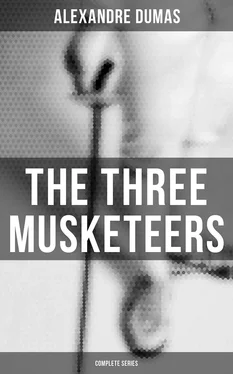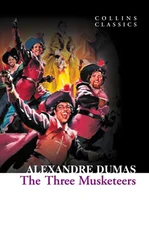Chapter 31
English and French
Table of Contents
The hour having come, they went with their four lackeys to a spot behind the Luxembourg given up to the feeding of goats. Athos threw a piece of money to the goatkeeper to withdraw. The lackeys were ordered to act as sentinels.
A silent party soon drew near to the same enclosure, entered, and joined the Musketeers. Then, according to foreign custom, the presentations took place.
The Englishmen were all men of rank; consequently the odd names of their adversaries were for them not only a matter of surprise, but of annoyance.
“But after all,” said Lord de Winter, when the three friends had been named, “we do not know who you are. We cannot fight with such names; they are names of shepherds.”
“Therefore your lordship may suppose they are only assumed names,” said Athos.
“Which only gives us a greater desire to know the real ones,” replied the Englishman.
“You played very willingly with us without knowing our names,” said Athos, “by the same token that you won our horses.”
“That is true, but we then only risked our pistoles; this time we risk our blood. One plays with anybody; but one fights only with equals.”
“And that is but just,” said Athos, and he took aside the one of the four Englishmen with whom he was to fight, and communicated his name in a low voice.
Porthos and Aramis did the same.
“Does that satisfy you?” said Athos to his adversary. “Do you find me of sufficient rank to do me the honor of crossing swords with me?”
“Yes, monsieur,” said the Englishman, bowing.
“Well! now shall I tell you something?” added Athos, coolly.
“What?” replied the Englishman.
“Why, that is that you would have acted much more wisely if you had not required me to make myself known.”
“Why so?”
“Because I am believed to be dead, and have reasons for wishing nobody to know I am living; so that I shall be obliged to kill you to prevent my secret from roaming over the fields.”
The Englishman looked at Athos, believing that he jested, but Athos did not jest the least in the world.
“Gentlemen,” said Athos, addressing at the same time his companions and their adversaries, “are we ready?”
“Yes!” answered the Englishmen and the Frenchmen, as with one voice.
“On guard, then!” cried Athos.
Immediately eight swords glittered in the rays of the setting sun, and the combat began with an animosity very natural between men twice enemies.
Athos fenced with as much calmness and method as if he had been practicing in a fencing school.
Porthos, abated, no doubt, of his too-great confidence by his adventure of Chantilly, played with skill and prudence. Aramis, who had the third canto of his poem to finish, behaved like a man in haste.
Athos killed his adversary first. He hit him but once, but as he had foretold, that hit was a mortal one; the sword pierced his heart.
Second, Porthos stretched his upon the grass with a wound through his thigh, As the Englishman, without making any further resistance, then surrendered his sword, Porthos took him up in his arms and bore him to his carriage.
Aramis pushed his so vigorously that after going back fifty paces, the man ended by fairly taking to his heels, and disappeared amid the hooting of the lackeys.
As to d’Artagnan, he fought purely and simply on the defensive; and when he saw his adversary pretty well fatigued, with a vigorous side thrust sent his sword flying. The baron, finding himself disarmed, took two or three steps back, but in this movement his foot slipped and he fell backward.
D’Artagnan was over him at a bound, and said to the Englishman, pointing his sword to his throat, “I could kill you, my Lord, you are completely in my hands; but I spare your life for the sake of your sister.”
D’Artagnan was at the height of joy; he had realized the plan he had imagined beforehand, whose picturing had produced the smiles we noted upon his face.
The Englishman, delighted at having to do with a gentleman of such a kind disposition, pressed d’Artagnan in his arms, and paid a thousand compliments to the three Musketeers, and as Porthos’s adversary was already installed in the carriage, and as Aramis’s had taken to his heels, they had nothing to think about but the dead.
As Porthos and Aramis were undressing him, in the hope of finding his wound not mortal, a large purse dropped from his clothes. D’Artagnan picked it up and offered it to Lord de Winter.
“What the devil would you have me do with that?” said the Englishman.
“You can restore it to his family,” said d’Artagnan.
“His family will care much about such a trifle as that! His family will inherit fifteen thousand louis a year from him. Keep the purse for your lackeys.”
D’Artagnan put the purse into his pocket.
“And now, my young friend, for you will permit me, I hope, to give you that name,” said Lord de Winter, “on this very evening, if agreeable to you, I will present you to my sister, Milady Clarik, for I am desirous that she should take you into her good graces; and as she is not in bad odor at court, she may perhaps on some future day speak a word that will not prove useless to you.”
D’Artagnan blushed with pleasure, and bowed a sign of assent.
At this time Athos came up to d’Artagnan.
“What do you mean to do with that purse?” whispered he.
“Why, I meant to pass it over to you, my dear Athos.”
“Me! why to me?”
“Why, you killed him! They are the spoils of victory.”
“I, the heir of an enemy!” said Athos; “for whom, then, do you take me?”
“It is the custom in war,” said d’Artagnan, “why should it not be the custom in a duel?”
“Even on the field of battle, I have never done that.”
Porthos shrugged his shoulders; Aramis by a movement of his lips endorsed Athos.
“Then,” said d’Artagnan, “let us give the money to the lackeys, as Lord de Winter desired us to do.”
“Yes,” said Athos; “let us give the money to the lackeys—not to our lackeys, but to the lackeys of the Englishmen.”
Athos took the purse, and threw it into the hand of the coachman. “For you and your comrades.”
This greatness of spirit in a man who was quite destitute struck even Porthos; and this French generosity, repeated by Lord de Winter and his friend, was highly applauded, except by MM. Grimaud, Bazin, Mousqueton and Planchet.
Lord de Winter, on quitting d’Artagnan, gave him his sister’s address. She lived in the Place Royale—then the fashionable quarter—at Number 6, and he undertook to call and take d’Artagnan with him in order to introduce him. d’Artagnan appointed eight o’clock at Athos’s residence.
This introduction to Milady Clarik occupied the head of our Gascon greatly. He remembered in what a strange manner this woman had hitherto been mixed up in his destiny. According to his conviction, she was some creature of the cardinal, and yet he felt himself invincibly drawn toward her by one of those sentiments for which we cannot account. His only fear was that Milady would recognize in him the man of Meung and of Dover. Then she knew that he was one of the friends of M. de Treville, and consequently, that he belonged body and soul to the king; which would make him lose a part of his advantage, since when known to Milady as he knew her, he played only an equal game with her. As to the commencement of an intrigue between her and M. de Wardes, our presumptuous hero gave but little heed to that, although the marquis was young, handsome, rich, and high in the cardinal’s favor. It is not for nothing we are but twenty years old, above all if we were born at Tarbes.
Читать дальше












